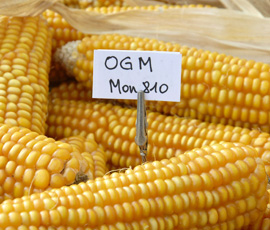Journal retracts French Monsanto GM rats study

A science journal is to retract a controversial study that claimed rats fed on a Monsanto GM maize developed cancer and died earlier.
The editor of internationally renowned journal Food and Chemical Toxicology (FCT), Dr A Wallace Hayes, has decided to retract the French study by the team of Prof Gilles-Eric Séralini.
The study found that that rats fed on a lifetime of Monsanto’s genetically modified (GM) maize NK603 and tiny amounts of the Roundup (glyphosate) herbicide it is grown with suffered severe toxic effects, including kidney and liver damage and increased rates of tumours and mortality.
Dr Hayes has sent Prof Séralini a letter, dated 19 November, which says the paper, published 14 months ago, will be retracted if he does not agree to its withdrawal.
In the letter, he concedes that an examination of Prof Séralini’s raw data showed “no evidence of fraud or intentional misrepresentation of the data” and nothing “incorrect” about the data.
However, Dr Hayes stated that the retraction was solely based on the “inconclusive” nature of the findings on tumours and mortality, given the relatively low number of rats used and the choice of rat strain, which Hayes said naturally has a “high incidence of tumours”.
The EU’s food safety watchdog, the European Food Safety Authority (EFSA), issued a statement last November saying the study had “serious defects in design and methodology” and it “did not meet acceptable scientific standards”.
More than 700 scientists and academics signed a statement calling on Prof Séralini to release all data from his research following publication of the study.
The decision to withdraw the study has drawn a mixed reaction from pro-science and anti-GM groups.
Prof Cathie Martin, group leader at the John Innes Centre, said: “The major flaws in this paper make its retraction the right thing to do.
“The strain of rats used is highly susceptible to tumours after 18 months with or without GMOs in their diets. Keeping animals alive beyond their recommended lifespan means the results are inconclusive and also raises serious animal welfare concerns.”
Prof David Spiegelhalter, Winton professor of the public understanding of risk at Cambridge University, said: “It was clear from even a superficial reading that this paper was not fit for publication, and in this instance the peer review process did not work properly.
“But at least this has now been remedied and the journal has recognised that no conclusions can be drawn from this study, so I suppose it is better late than never.”
However, UK-based anti-GM lobby group GMWatch described the move as “illicit, unscientific, and unethical”. It added that inconclusive data was not sufficient grounds for a retraction.
A Monsanto UK spokesman said: “When the article was published, Monsanto noted the study did not meet minimum acceptable standards for this type of scientific research, that its findings were not supported by the data presented, and that its conclusions were not relevant for the purpose of safety assessment.
“Monsanto was not alone in questioning the study. EFSA reviewed the study and determined that it fails to meet ‘acceptable scientific standards’. In addition, a number of other countries including Belgium, Denmark, France, Germany, Italy and the Netherlands also completed separate reviews and reached the same conclusions about the study.”
Monsanto withdraws GM applications in EU

